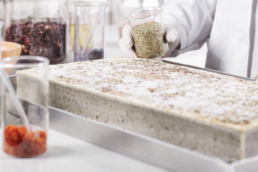In South Korea, the disposal of municipal waste is divided into landfill, recycling, composting, and incineration. All food waste disposal is charged based on the volume or weight, depending on the municipality’s chosen method. The fees are collected in proportion to the amount of food waste through the cost of purchasing the bags. As you can see, waste management is very important in South Korea, and they are always on the lookout for waste management startups in Korea that can offer new solutions. In addition, the Korean government has been focused heavily on climate change and pollution, which has created many innovative waste management startups in Korea. These startups are geared toward finding better clean technology solutions for waste disposal.
Waste Management Startups in Korea
Nuvilab

Nuvilab is a food data analysis company that uses AI technology for food waste analysis. It has developed a food scanner that uses deep-learning technology to estimate the volume of leftover food on the plate with an accuracy of over 95%. The startup currently caters to private schools and businesses.
SuperBin

The top social impact startup in Korea is SuperBin. They develop solutions for recycling plastic debris. Their main product is a reverse vending machine called Nephron, which offers a financial reward for people who recycle plastics. Therefore, SuperBin allows people to make money from doing what they do every day: throwing away plastic. In addition, their bins take not only plastic bottles but also aluminum cans. Nephron uses AI technology to identify, sort, collect, and process trash.
SuperBin raised over $16 million in series B funding, putting its total valuation at over $80 million. The series B funding round included Naver-backed investment firm TBT Partners and Fine Investment, to name a few.
“To build a robust collection system, a sense of environmental responsibility is not enough. Financial incentives are needed to change people’s behaviors,” said the CEO of SuperBin, Kim Jeong-bin.
Oysterable

Oysterable created a smart IoT recycling solution for businesses and local governments. People can participate in recycling and receive rewards through their smart recycling bins. The bin works with a mobile app so people can keep track of their rewards. Moreover, the bins can be installed anywhere. So far have been installed in over 180 locations across Korea.
These locations include residential complexes, public offices, community centers, markets, and tourist attractions. The bins have increased recycling by up to 68% in the area.
Furthermore, it is easy for people to use. Just download the app, scan the QR code on the bins, and scan the barcode from the recycled item. Users will be able to keep track of their points through the app.
Reco

Reco is a waste recycling startup that runs a waste platform called UpBox. UpBox connects waste producers and delivery handlers based on supply and demand data. Moreover, it provides real-time waste data and cost analysis, environmental impact measurements, smart logistics, and administrative work. Therefore, waste dischargers can reduce treatment costs by 20%. In addition, they can save management time by 80%.
Ecube Labs

Ecube Labs provides solutions for smart waste management to save collection costs. They also developed Clean Cube, a solar-powered trash compactor that uses wireless technology. Using solar energy, Clean Cube trash bins detect the quantity of waste they collect and can hold up to 8x more trash than non-compacting models. In addition, they also developed CleanFlex, which is an ultrasonic fill-level sensor attachable to any trash can. It monitors the quantity of contained waste. CleanFlex collects waste data and sends them wirelessly so users can remotely check the volume of collected waste using the internet.
Popular
Related Posts
ChatGPT in Korea is Changing Work for Startups
February 24, 2023
Genetics Startups in Korea Changing the Future of Healthcare
February 7, 2024
Edtech SaaS Startups in Korea for Classroom Management
February 3, 2024






